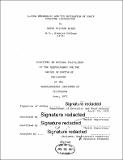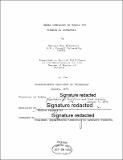- Communications
- Computer Science
- Criminal Justice
- Environmental Management
- Forensic Psychology
- Healthcare Admin
- Human Resources
- Project Management
- Social work
- Special Education
- Sports Management
- Supply Chain Management
- Adult Education
- Business Intelligence
- Early Childhood Education
- Educational Technology
- Homeland Security
- Information Systems Security
- Information Technology
- International Business
- Management Information Systems
- Nonprofit Management
- School Counseling
- Academic Publishing Guide
- Building a Graduate School Resume or CV

Choosing Between a Thesis or Non-thesis Master's Degree
- Expert Guide to Studying Abroad
- FAQ: Online Master's Degrees
- Grad School Guide Book
- Graduate School for Students with Disabilities
- Green Graduate Degrees
- How to Be a Successful Grad Student
- How to Choose the Right Graduate Program
- How to Get a Master's Degree in an Unrelated Field
- How to Transfer College Credits in Grad School
- How to Write a Winning Personal Statement
- Inside Graduate Admissions
- Ivy League Grad Schools
- Master's Degrees for Veterans
- Master's Degree for Women
- Mental Health in Grad School
- Progressive LGBTQ Graduate Degrees
- Should You Apply for a Graduate School Assistantship?
- Surviving Grad School with a Family
- Taking a Gap Year Before Grad School
- Women in STEM Graduate Resources
- Writing a Successful Statement of Purpose
- Alternative Ways to Pay for School
- The Best Part-Time Jobs During Grad School
- Company Funded Graduate School
- FAFSA For Grad Students
- Financial Aid Resources
- Graduate Student Loans
- Paying for Your Master's Degree
- Paying Off Student Loans
- Paying for Your PhD
- Fellowship Opportunities
- LGBTQ Scholarships
- MBA Scholarships
- Scholarship Resources
- Scholarships for Veterans
- Scholarships for Women
- Crushing the GRE Guidebook
- GMAT Guidebook
- Guide to the LSAT
- MCAT Prep for Medical School
- Study Guide: Exam Resources
- TOEFL Prep for Non-Native English Speakers
- Resources Choosing Between a Thesis or Non-thesis Master's Degree
As of 2015, approximately 25.4 million Americans held advanced degrees , with more citizens joining these ranks each year. As studies continue to show the career advancement and salary benefits of completing a master's degree, more and more students elect to pursue advanced educations. When considering their options, many question whether to enroll in a master's requiring a thesis or not. The following guide examines some of the reasons degree seekers may want to write a thesis while also highlighting why they might not. Students on the fence about this important decision can find expert advice, actionable tips, and relevant guidance to help them make an informed choice in the guide that follows.
Understanding the Master's Thesis
What is the difference between a thesis & non-thesis master's program, the decision not to do a thesis.
As students research various master's programs in their chosen discipline, it's common to find that many degrees require a thesis – especially if they want to enter a research-heavy field. While this word gets thrown around a lot in academia, some learners may want more information regarding what it entails in order to make an informed decision.
What is a Master's Thesis?
The master's thesis is an original piece of scholarship allowing the student to dig into a topic and produce an expanded document that demonstrates how their knowledge has grown throughout the degree program. These documents require significant independent research of primary and secondary sources and, depending on the subject, may require interviews and/or surveys to support the overarching argument.
Individual schools and departments dictate the length of these documents, but they typically range between 60 and 100 pages – or approximately 20,000 to 40,000 words. While tackling a document of such heft may seem overwhelming at first, learners need not fret. Each master's candidate receives a faculty advisor early in their tenure to provide support, feedback, and guidance throughout the process. Because the final thesis is expected to be of a publishable quality, learners seeking the highest marks typically send their supervisor excerpts of the document as they write to ensure they are on the right track.
When picking a thesis topic, no magical formula exists. Students should consider their interests and read extensively on that topic to get a better sense of existing scholarship. They should also speak to other academics working in that sphere to familiarize themselves with ongoing projects. Only after they feel reasonably well-read should they begin looking for uncovered angles or interesting ways of using emerging methodologies to bring new light to the topic.
When considering formatting, degree seekers should check with their specific schools and departments, as they may have unique requirements. To get a general understanding of what to expect, learners can review Simon Fraser University's guidelines on thesis formatting. After completing the thesis, some programs require an oral defense before a committee while others read the document and provide a grade. Check with your prospective schools to get a better sense of procedure.
Format & Components of a Master's Thesis
While this guide attempts to provide helpful and actionable information about the process of deciding whether to follow a thesis or non-thesis track in a master's program, readers should remember that specific components and requirements of a thesis vary according to discipline, university, and department. That being said, some commonalities exist across all these – especially when it comes to what students must include in their final drafts.
As the first section a reader encounters after moving through the table of contents and other anterior text, the introductory allows the writer to firmly establish what they want to accomplish. Sometimes also called the "research question" section, the introductory must clearly state the goals of the paper and the overarching hypothesis guiding the argument. This should be written in a professional yet accessible tone that allows individuals without specializations in the field to understand the text.
This section allows learners to demonstrate their deep knowledge of the field by providing context to existing texts within their chosen discipline Learners review the main bodies of work, highlighting any issues they find within each. Constructive criticism often centers around shortcomings, blind spots, or outdated hypotheses.
Students use this section to explain how they went about their work. While scientists may point to a specific method used to reach conclusions, historians may reference the use of an emerging framework for understanding history to bring new light to a topic. The point of this section is to demonstrate the thought processes that led to your findings.
This section allows for learners to show what they learned during the research process in a non-biased way. Students should simply state what information they gathered by utilizing a specific framework or methodology and arrange those findings, without interpretation, in an easy-to-read fashion.
After providing readers with all the necessary information, the discussion section exists for candidates to interpret the raw data and demonstrate how their research led to a new understanding or contributed a unique perspective to the field. This section should directly connect to the introduction by reinforcing the hypothesis and showing how you answered the questions posed.
Even though the previous sections give prospective degree seekers a better sense of what to expect if they decide to write a thesis during their master's program, they don't necessarily help learners decide whether to pursue a thesis or non-thesis track. The following section highlights some of the reasons students frequently choose to complete a thesis or bypass the process altogether by providing a pros and cons list.
Why a Thesis Program
- Especially when entering a research-heavy discipline, completing a thesis shows prospective schools and employers that you possess the skills needed for researching and writing long-form reports.
- Students hoping to pursue a Ph.D. stand in better stead with admissions panels if they wrote a thesis during a master's program.
- Individuals hoping to enter a field that values syntax and grammar often better their writing skills by completing a thesis.
- Students who write a thesis can submit the final product to various academic journals, increasing their chances of getting published.
- Theses expand students' understanding of what they're capable of, deepen their ability to carry out an argument, and develop their skills in making connections between ideas.
Why a Non-thesis Program
- Because they don't require a significant written product, non-thesis master's tend to take less time to complete.
- Often mirrors a bachelor's program in terms of structure, allowing learners to complete classes and take exams without a great deal of research or writing.
- Students who excel in project-based assignments can continue building skills in this arena rather than focusing on skills they don't plan to use (e.g. research)
- Provides learners the opportunity to work more closely and more frequently with faculty on real-world projects since they don't spend hundreds of hours researching/writing.
- Allows learners to take more classes and gain hands-on skills to fill the time they would have spent researching and writing a thesis.
How to Choose a Master's Program: FAQs
Within some academic disciplines and professional fields, research and writing plays a key role in work done on a daily basis. Because of this, master's programs in these fields require learners to complete theses to compete against peers and be seen as competent in their work. Other disciplines, conversely, rely on other tools to accomplish work and progress ideas – making theses less important.
Yes. Master's programs focused more on application than research typically don't require a thesis – although they may still give students the option. Examples of common non-thesis master's programs include nursing, business, and education.
Even though non-thesis students won't be writing a 100-page paper, that doesn't mean they avoid completing a significant project. In place of a thesis, most applied master's programs require students to take part in at least one internship or complete a culminating project. These projects typically ask learners to take what they learned throughout coursework and create an expansive final project – examples include case studies, creative works, or portfolios.
While students who followed a non-thesis path routinely receive acceptance to Ph.D. programs, those with theses often find the process easier. Even if a learner pursues a Ph.D. in a discipline that isn't research-heavy, admissions panels still want to get a sense of your academic interests and ability to engage in independent, nuanced thought. Students with theses can provide solid proof of these skills, while those without may struggle to demonstrate preparedness as thoroughly.
The answer to this question depends on many factors, but typically it is okay not to do a thesis if you plan to enter a field that doesn't depend heavily on research or writing, or if you don't plan to complete a Ph.D.
Students wanting to work in academic, research, or writing should always opt for the thesis track. They should also follow this path if they have any doctoral degree aspirations.
Ultimately, the decision of whether or not to complete a thesis rests with the individual student. Figuring out how to proceed on this front requires lots of careful consideration, and learners should ensure they consider various aspects before coming to a final decision. The following section helps students consider how they should and should not come to a conclusion.
Dos and Don'ts of Choosing a Thesis or Non-thesis Program
- Consider the longevity of your decision: will you feel the same in 5-10 years or are you making a decision based on current desires?
- Talk to others who with experience in this area. Ask them questions about their decision-making process and if they regret their choice.
- Research potential thesis topics before starting a program. Going in with a game plan can help you feel more confident and settled about the process than if you're scrambling for a topic while in school.
- Reach out to prospective schools to speak with faculty and/or current students following both tracks. This will provide knowledge specific to the school while also expanding your network if you choose to attend there.
- Research Ph.D. entrance requirements to ascertain if the majority expect learners to possess a thesis when applying. This will give you a sense of whether you may experience issues later on if you do not complete one.
- Decide not to complete a thesis simply because you have never taken on such a task and feel overwhelmed or fearful that you will fail.
- Complete a thesis simply because you think it will look good on your resume. Theses require intense devotion over an extended amount of time; learners who complete them without conviction often find the process miserable.
- Forget to research alternatives to writing a thesis. Just because you don't complete a research paper doesn't mean a non-thesis track lacks rigor or challenging coursework.
- Forget to read examples of theses by previous students. If you feel overwhelmed by the task, reading work other people have done can often make the task at hand feel less scary.
- Let yourself off easy by taking the non-thesis path. If you find you have extra time in the program, talk to your advisor about taking more classes, develop meaningful projects for yourself, or see about presenting at an academic conference.
From the Expert

Sudiksha Joshi, Ph.D. is a learning advocate. Her mission is to empower our youth to think bigger, bolder thoughts and forge a career path that will change the world. She taps into her natural curiosity and ability to identify strengths to help students and those in transition find their path from feeling lost in the traditional ways of achieving success to charting their own path. Her work has been featured in Forbes, Huffington Post, Thrive Global, Medium and LinkedIn.
Why might a student decide to follow a thesis track? Why might they follow a non-thesis track?
A student might decide to take a thesis track if she/he wants to pursue a Ph.D. Also, if the students want to focus on careers where research and writing have a strong focus, the students opt for the thesis option. Research assistantships at the graduate level are also more often available to students who opt for the thesis option.
A student who might feel that writing is not one of their strengths might choose to go the non-thesis track. Likewise, a student who has other work commitments may find a non-thesis option more convenient.
Do you have any tips for deciding on a program?
I chose a thesis option because being able to conduct independent research was a big reason to go to graduate school. Also, showing the ability that I could do research was what afforded me research assistantships which meant that my tuition was paid for and I got a stipend that paid for expenses while I was in graduate school. This also allowed me the opportunity to work closely with the faculty mentor that provided me with the support and the accountability I wanted.
I would not recommend taking a non-thesis option if all the degree requires is for you to take courses. You have little to show in terms of your learning other than your grades unless you are already working on something on the side that does that for you and all you need is a certificate.
Opt for a non-thesis option if you can still work closely with a professor or on a project and if you'd rather be involved in multiple projects rather than focus on a single project. If you already have a good (informed) reason for choosing one over the other, go for it.
What's the most important thing to consider when choosing a program?
The most important thing to consider when choosing a program is getting excited about the projects that at least one of the faculty members are involved in. Do some research and see why you are excited about a particular work that at least one of the faculty members have been involved in.
Who should students talk to when considering options?
Students should talk to other students and also reach out directly to the graduate coordinator and even individual faculty members. This means that students should have done prior homework and have some good questions ready. Asking good questions will get you at least halfway through to make the right decision.
/images/cornell/logo35pt_cornell_white.svg" alt="master thesis in us"> Cornell University --> Graduate School
Guide to writing your thesis/dissertation, definition of dissertation and thesis.
The dissertation or thesis is a scholarly treatise that substantiates a specific point of view as a result of original research that is conducted by students during their graduate study. At Cornell, the thesis is a requirement for the receipt of the M.A. and M.S. degrees and some professional master’s degrees. The dissertation is a requirement of the Ph.D. degree.
Formatting Requirement and Standards
The Graduate School sets the minimum format for your thesis or dissertation, while you, your special committee, and your advisor/chair decide upon the content and length. Grammar, punctuation, spelling, and other mechanical issues are your sole responsibility. Generally, the thesis and dissertation should conform to the standards of leading academic journals in your field. The Graduate School does not monitor the thesis or dissertation for mechanics, content, or style.
“Papers Option” Dissertation or Thesis
A “papers option” is available only to students in certain fields, which are listed on the Fields Permitting the Use of Papers Option page , or by approved petition. If you choose the papers option, your dissertation or thesis is organized as a series of relatively independent chapters or papers that you have submitted or will be submitting to journals in the field. You must be the only author or the first author of the papers to be used in the dissertation. The papers-option dissertation or thesis must meet all format and submission requirements, and a singular referencing convention must be used throughout.
ProQuest Electronic Submissions
The dissertation and thesis become permanent records of your original research, and in the case of doctoral research, the Graduate School requires publication of the dissertation and abstract in its original form. All Cornell master’s theses and doctoral dissertations require an electronic submission through ProQuest, which fills orders for paper or digital copies of the thesis and dissertation and makes a digital version available online via their subscription database, ProQuest Dissertations & Theses . For master’s theses, only the abstract is available. ProQuest provides worldwide distribution of your work from the master copy. You retain control over your dissertation and are free to grant publishing rights as you see fit. The formatting requirements contained in this guide meet all ProQuest specifications.
Copies of Dissertation and Thesis
Copies of Ph.D. dissertations and master’s theses are also uploaded in PDF format to the Cornell Library Repository, eCommons . A print copy of each master’s thesis and doctoral dissertation is submitted to Cornell University Library by ProQuest.
Purdue Online Writing Lab Purdue OWL® College of Liberal Arts
Thesis and Dissertation: Getting Started

Welcome to the Purdue OWL
This page is brought to you by the OWL at Purdue University. When printing this page, you must include the entire legal notice.
Copyright ©1995-2018 by The Writing Lab & The OWL at Purdue and Purdue University. All rights reserved. This material may not be published, reproduced, broadcast, rewritten, or redistributed without permission. Use of this site constitutes acceptance of our terms and conditions of fair use.
The resources in this section are designed to provide guidance for the first steps of the thesis or dissertation writing process. They offer tools to support the planning and managing of your project, including writing out your weekly schedule, outlining your goals, and organzing the various working elements of your project.
Weekly Goals Sheet (a.k.a. Life Map) [Word Doc]
This editable handout provides a place for you to fill in available time blocks on a weekly chart that will help you visualize the amount of time you have available to write. By using this chart, you will be able to work your writing goals into your schedule and put these goals into perspective with your day-to-day plans and responsibilities each week. This handout also contains a formula to help you determine the minimum number of pages you would need to write per day in order to complete your writing on time.
Setting a Production Schedule (Word Doc)
This editable handout can help you make sense of the various steps involved in the production of your thesis or dissertation and determine how long each step might take. A large part of this process involves (1) seeking out the most accurate and up-to-date information regarding specific document formatting requirements, (2) understanding research protocol limitations, (3) making note of deadlines, and (4) understanding your personal writing habits.
Creating a Roadmap (PDF)
Part of organizing your writing involves having a clear sense of how the different working parts relate to one another. Creating a roadmap for your dissertation early on can help you determine what the final document will include and how all the pieces are connected. This resource offers guidance on several approaches to creating a roadmap, including creating lists, maps, nut-shells, visuals, and different methods for outlining. It is important to remember that you can create more than one roadmap (or more than one type of roadmap) depending on how the different approaches discussed here meet your needs.
- Technical Support
- Find My Rep
You are here
How to Write a Master's Thesis
- Yvonne N. Bui - San Francisco State University, USA
- Description
See what’s new to this edition by selecting the Features tab on this page. Should you need additional information or have questions regarding the HEOA information provided for this title, including what is new to this edition, please email [email protected] . Please include your name, contact information, and the name of the title for which you would like more information. For information on the HEOA, please go to http://ed.gov/policy/highered/leg/hea08/index.html .
For assistance with your order: Please email us at [email protected] or connect with your SAGE representative.
SAGE 2455 Teller Road Thousand Oaks, CA 91320 www.sagepub.com
“Yvonne Bui’s How to Write a Master’s Thesis should be mandatory for all thesis track master’s students. It steers students away from the shortcuts students may be tempted to use that would be costly in the long run. The step by step intentional approach is what I like best about this book.”
“This is the best textbook about writing an M.A. thesis available in the market.”
“This is the type of textbook that students keep and refer to after the class.”
Excellent book. Thorough, yet concise, information for students writing their Master's Thesis who may not have had a strong background in research.
Clear, Concise, easy for students to access and understand. Contains all the elements for a successful thesis.
I loved the ease of this book. It was clear without extra nonsense that would just confuse the students.
Clear, concise, easily accessible. Students find it of great value.
NEW TO THIS EDITION:
- Concrete instruction and guides for conceptualizing the literature review help students navigate through the most challenging topics.
- Step-by-step instructions and more screenshots give students the guidance they need to write the foundational chapter, along with the latest online resources and general library information.
- Additional coverage of single case designs and mixed methods help students gain a more comprehensive understanding of research methods.
- Expanded explanation of unintentional plagiarism within the ethics chapter shows students the path to successful and professional writing.
- Detailed information on conference presentation as a way to disseminate research , in addition to getting published, help students understand all of the tools needed to write a master’s thesis.
KEY FEATURES:
- An advanced chapter organizer provides an up-front checklist of what to expect in the chapter and serves as a project planner, so that students can immediately prepare and work alongside the chapter as they begin to develop their thesis.
- Full guidance on conducting successful literature reviews includes up-to-date information on electronic databases and Internet tools complete with numerous figures and captured screen shots from relevant web sites, electronic databases, and SPSS software, all integrated with the text.
- Excerpts from research articles and samples from exemplary students' master's theses relate specifically to the content of each chapter and provide the reader with a real-world context.
- Detailed explanations of the various components of the master's thesis and concrete strategies on how to conduct a literature review help students write each chapter of the master's thesis, and apply the American Psychological Association (APA) editorial style.
- A comprehensive Resources section features "Try It!" boxes which lead students through a sample problem or writing exercise based on a piece of the thesis to reinforce prior course learning and the writing objectives at hand. Reflection/discussion questions in the same section are designed to help students work through the thesis process.
Sample Materials & Chapters
1: Overview of the Master's Degree and Thesis
3: Using the Literature to Research Your Problem
For instructors
Select a purchasing option, related products.


- On-Campus Graduate Programs
- Online Master’s Progams
- Curricular Practical Training
- Engineering Alumni Program
- Engineering Library
- Academic Options
- Billing and Tuition
- Dissertation Information
- Graduation Procedures
- Master’s Thesis Information
- Student Code of Conduct
- Graduate Advising
- Graduate Program Contacts
- RAS Information + Hours
- Graduate Student Wellness + Resources
- Student Wellness Information
- Student Clubs + Organizations
- Graduate Student Awards
- Make a Gift
- Current Students
- Student Handbook
- Master’s Thesis
Master's Thesis
Writing a thesis is optional for some master’s programs and not required. There are abundant opportunities for personalized interaction with faculty through research courses, independent studies, and seminars. If a student chooses to write a thesis, it requires eight courses and either two research credits (5970), or in some cases with program specific approval, one research credit (5970) and one independent study (5990). Two credits must be completed for a letter grade for successful completion of the master’s thesis.
A thesis or research paper based on joint work with other researchers is allowed, provided that a unique and separate document is presented by each degree candidate. The candidate must include a concise account of his or her contribution to the whole work. Authorship of a master’s thesis or research paper by more than one degree candidate is not allowed.
University Style Guide for Master’s Thesis
Please submit your thesis electronically at this time to Graduate Engineering. Directions will be sent via email after the graduation application closes for that period.
Font, Spacing, and Margin Requirements Any non-italic font 10-12 points in size should be used. Headings may be larger. For enhanced screen readability, use Arial (10pt), Courier New (10pt), Georgia (11pt), Times New Roman (12 pt), or Verdana (10pt) font. For footnotes, figures, citations, charts and graphs, a font of 8 point or larger should be used. Italic type may be used for quotations, words in a foreign language, occasional emphasis, or book titles. For the sake of readability, it is recommended that the text of the dissertation be double-spaced (except for footnotes, long quoted passages, and lists of tables and figures, which are single-spaced). If desired, authors may chose to single-space the abstract and/or thesis manuscript.
Allow one and one-half inches for the left margin and one inch for all other margins. All text, including page numbers, must fit within these margins. Please remember to include the title page in the margin allowance. Organization of the Manuscript Pages must appear in the following order:
Title Page Dedication (optional) Acknowledgment (optional) Abstract (optional) Table of Contents (mandatory for theses 50 pages or longer) List of Tables (optional) List of Figures/Illustrations (optional) Main Text Appendices (optional) Bibliography/Works Cited
Title Page The Title Page must follow the sample format . The author’s full legal name must appear on the Title Page and the completed thesis must have electronic signatures when deposited electronically to Graduate Engineering. The sample shows how to list a co-supervisor if you have one. If not, please omit from your Title Page and list only the supervisor and director/chair’s names and signatures. Some Master’s Program’s have a Program Director, while others only have their Graduate Group Chair. If you are unsure if you have a director or chair, please talk with your program coordinator/administrator so you have that person’s title listed properly on the Title Page. Although the Title Page counts as page “i” of the preliminary pages, no page number appears on the Title Page. A Table of Contents m ust be included if the thesis is 50 pages or longer.
Pagination All pages (except the Title Page: page i) must have a page number. For the preliminary pages (dedication, acknowledgements, table of contents, lists of graphs, tables, and illustrations), use small Roman numerals (i, ii, iii, …). For the text and appendices (if any), use Arabic numerals (1, 2, 3, …). Remember that page numbers must also appear within the margins specified above.
Other Requirements For citations, footnotes, references, and grammar, you may follow the guidelines in the Chicago Manual of Style, the MLA Handbook, or the appropriate manual in your field of study.
Student Handbook sections:
- Graduate Programs
- Academic Standing Requirements
- Registration Procedures
- Forms and Requests
- Penn Policies
- Graduate Student Resources
- Research Support Plan for Ph.D. students
Return to Table of Contents
How to Write a Master's Thesis: A Guide to Planning Your Thesis, Pursuing It, and Avoiding Pitfalls
#scribendiinc
Part 1: Initial Considerations
Who needs to write a master’s thesis.
Thesis writing is one of the more daunting challenges of higher education. That being said, not all master's students have to write a thesis. For example, fields that place a stronger emphasis on applied knowledge, such as nursing, business, and education, tend to have projects and exams to test students on the skills and abilities associated with those fields. Conversely, in disciplines that require in-depth research or highly polished creative abilities, students are usually expected to prove their understanding and independence with a thesis.
What's Your Goal?
Do you want to write a thesis? The process is a long one, often spanning years. It's best to know exactly what you want before you begin. Many people are motivated by career goals. For example, hiring managers may see a master's degree as proof that the candidate is an expert within their field and can lead, motivate, and demonstrate initiative for themselves and others. Others dream of earning their doctorate, and they see a master's degree as a stepping stone toward their Ph.D .

No matter what your desired goal is, you should have one before you start your thesis. With your goal in mind, your work will have a purpose, which will allow you to measure your progress more easily.
Major Types of Theses
Once you've carefully researched or even enrolled in a master's program—a feat that involves its own planning and resources —you should know if you are expected to produce a quantitative (which occurs in many math and science programs), qualitative (which occurs in many humanities programs), or creative (which occurs in many creative writing, music, or fine arts programs) thesis.
Time and Energy Considerations
Advanced degrees are notoriously time and energy consuming. If you have a job, thesis writing will become your second job. If you have a family, they will need to know that your thesis will take a great deal of your attention, energy, and focus.

Your studies should not consume you, but they also should not take a back seat to everything else. You will be expected to attend classes, conduct research, source relevant literature, and schedule meetings with various people as you pursue your master's, so it's important to let those you care about know what's going on.
As a general note, most master's programs expect students to finish within a two-year period but are willing to grant extra time if requested, especially if that time is needed to deal with unexpected life events (more on those later).
Part 2: Form an Initial Thesis Question, and Find a Supervisor
When to begin forming your initial thesis question.
Some fields, such as history, may require you to have already formed your thesis question and to have used it to create a statement of intent (outlining the nature of your research) prior to applying to a master’s program. Others may require this information only after you've been accepted. Most of the time, you will be expected to come up with your topic yourself. However, in some disciplines, your supervisor may assign a general research topic to you.
Overall, requirements vary immensely from program to program, so it's best to confirm the exact requirements of your specific program.
What to Say to Your Supervisor
You will have a supervisor during your master's studies. Have you identified who that person will be? If yes, have you introduced yourself via email or phone and obtained information on the processes and procedures that are in place for your master's program? Once you've established contact, request an in-person meeting with him or her, and take a page of questions along with you. Your questions might include:
- Is there a research subject you can recommend in my field?
- I would like to pursue [target research subject] for my thesis. Can you help me narrow my focus?
- Can you give me an example of a properly formatted thesis proposal for my program?
Don't Be Afraid to Ask for Help (to a Degree)
Procedures and expectations vary from program to program, and your supervisor is there to help remove doubt and provide encouragement so you can follow the right path when you embark on writing your thesis. Since your supervisor has almost certainly worked with other graduate students (and was one at some point), take advantage of their experience, and ask questions to put your mind at ease about how to write a master’s thesis.
That being said, do not rely too heavily on your supervisor. As a graduate student, you are also expected to be able to work independently. Proving your independent initiative and capacity is part of what will earn you your master's degree.
Part 3: Revise Your Thesis
Read everything you can get your hands on.
Whether you have a question or need to create one, your next step is simple and applies to all kinds of theses: read.

Seek Out Knowledge or Research Gaps
Read everything you can that relates to the question or the field you are studying. The only way you will be able to determine where you can go is to see where everyone else has been. After you have read some published material, you will start to spot gaps in current research or notice things that could be developed further with an alternative approach. Things that are known but not understood or understood but not explained clearly or consistently are great potential thesis subjects. Addressing something already known from a new perspective or with a different style could also be a potentially valuable project. Whichever way you choose to do it, keep in mind that your project should make a valuable contribution to your field.

Talk with Experts in Your Field (and Don't Be Afraid to Revise Your Thesis)
To help narrow down your thesis topic, talk to your supervisor. Your supervisor will have an idea of what is current in your field and what can be left alone because others are already working on it. Additionally, the school you are attending will have programs and faculty with particular areas of interest within your chosen field.
On a similar note, don't be surprised if your thesis question changes as you study. Other students and researchers are out there, and as they publish, what you are working on can change. You might also discover that your question is too vague, not substantial enough, or even no longer relevant. Do not lose heart! Take what you know and adjust the question to address these concerns as they arise. The freedom to adapt is part of the power you hold as a graduate student.
Part 4: Select a Proposal Committee
What proposal committees are and why they're useful.
When you have a solid question or set of questions, draft a proposal.

You'll need an original stance and a clear justification for asking, and answering, your thesis question. To ensure this, a committee will review your thesis proposal. Thankfully, that committee will consist of people assigned by your supervisor or department head or handpicked by you. These people will be experts who understand your field of study and will do everything in their power to ensure that you are pursuing something worthwhile. And yes, it is okay to put your supervisor on your committee. Some programs even require that your supervisor be on your committee.
Just remember that the committee will expect you to schedule meetings with them, present your proposal, respond to any questions they might have for you, and ultimately present your findings and thesis when all the work is done. Choose those who are willing to support you, give constructive feedback, and help address issues with your proposal. And don't forget to give your proposal a good, thorough edit and proofread before you present it.
How to Prepare for Committee Meetings
Be ready for committee meetings with synopses of your material for committee members, answers for expected questions, and a calm attitude. To prepare for those meetings, sit in on proposal and thesis defenses so you can watch how other graduate students handle them and see what your committee might ask of you. You can even hold rehearsals with friends and fellow students acting as your committee to help you build confidence for your presentation.

Part 5: Write Your Thesis
What to do once your proposal is approved.
After you have written your thesis proposal and received feedback from your committee, the fun part starts: doing the work. This is where you will take your proposal and carry it out. If you drafted a qualitative or quantitative proposal, your experimentation or will begin here. If you wrote a creative proposal, you will now start working on your material. Your proposal should be strong enough to give you direction when you perform your experiments, conduct interviews, or craft your work. Take note that you will have to check in with your supervisor from time to time to give progress updates.

Thesis Writing: It's Important to Pace Yourself and Take Breaks
Do not expect the work to go quickly. You will need to pace yourself and make sure you record your progress meticulously. You can always discard information you don't need, but you cannot go back and grab a crucial fact that you can't quite remember. When in doubt, write it down. When drawing from a source, always create a citation for the information to save your future self time and stress. In the same sense, you may also find journaling to be a helpful process.
Additionally, take breaks and allow yourself to step away from your thesis, even if you're having fun (and especially if you're not). Ideally, your proposal should have milestones in it— points where you can stop and assess what you've already completed and what's left to do. When you reach a milestone, celebrate. Take a day off and relax. Better yet, give yourself a week's vacation! The rest will help you regain your focus and ensure that you function at your best.
How to Become More Comfortable with Presenting Your Work
Once you start reaching your milestones, you should be able to start sharing what you have. Just about everyone in a graduate program has experience giving a presentation at the front of the class, attending a seminar, or watching an interview. If you haven't (or even if you have), look for conferences and clubs that will give you the opportunity to learn about presenting your work and become comfortable with the idea of public speaking. The more you practice talking about what you are studying, the more comfortable you'll be with the information, which will make your committee defenses and other official meetings easier.
Published authors can be called upon to present at conferences, and if your thesis is strong, you may receive an email or a phone call asking if you would share your findings onstage.
Presenting at conferences is also a great way to boost your CV and network within your field. Make presenting part of your education, and it will become something you look forward to instead of fear.
What to Do If Your Relationship with Your Supervisor Sours
A small aside: If it isn't already obvious, you will be communicating extensively with others as you pursue your thesis. That also means that others will need to communicate with you, and if you've been noticing things getting quiet, you will need to be the one to speak up. Your supervisor should speak to you at least once a term and preferably once a week in the more active parts of your research and writing. If you give written work to your supervisor, you should have feedback within three weeks.
If your supervisor does not provide feedback, frequently misses appointments, or is consistently discouraging of your work, contact your graduate program advisor and ask for a new supervisor. The relationship with your supervisor is crucial to your success, especially if she or he is on your committee, and while your supervisor does not have to be friendly, there should at least be professional respect between you.
What to Do If a Crisis Strikes
If something happens in your life that disrupts everything (e.g., emotional strain, the birth of a child, or the death of a family member), ask for help. You are a human being, and personal lives can and do change without warning. Do not wait until you are falling apart before asking for help, either. Learn what resources exist for crises before you have one, so you can head off trauma before it hits. That being said, if you get blindsided, don't refuse help. Seek it out, and take the time you need to recover. Your degree is supposed to help you become a stronger and smarter person, not break you.
Part 6: Polish and Defend Your Master's Thesis
How to write a master’s thesis: the final stages.
After your work is done and everything is written down, you will have to give your thesis a good, thorough polishing. This is where you will have to organize the information, draft it into a paper format with an abstract, and abbreviate things to help meet your word-count limit. This is also where your final editing and proofreading passes will occur, after which you will face your final hurdle: presenting your thesis defense to your committee. If they approve your thesis, then congratulations! You are now a master of your chosen field.
Conclusion and Parting Thoughts
Remember that you do not (and should not) have to learn how to write a master’s thesis on your own. Thesis writing is collaborative, as is practically any kind of research.

While you will be expected to develop your thesis using your own initiative, pursue it with your own ambition, and complete it with your own abilities, you will also be expected to use all available resources to do so. The purpose of a master's thesis is to help you develop your own independent abilities, ensuring that you can drive your own career forward without constantly looking to others to provide direction. Leaders get master's degrees. That's why many business professionals in leadership roles have graduate degree initials after their last names. If you already have the skills necessary to motivate yourself, lead others, and drive change, you may only need your master's as an acknowledgement of your abilities. If you do not, but you apply yourself carefully and thoroughly to the pursuit of your thesis, you should come away from your studies with those skills in place.
A final thought regarding collaboration: all theses have a section for acknowledgements. Be sure to say thank you to those who helped you become a master. One day, someone might be doing the same for you.
Image source: Falkenpost/Pixabay.com
We’re Masters at Master’s Theses! Make Yours Shine.
Let our expert academic editors perfect your writing, or get a free sample, about the author.

A Scribendi in-house editor, Anthony is happily putting his BA in English from Western University to good use with thoughtful feedback and incisive editing. An avid reader and gamer, he can be found during his off hours enjoying narrative-driven games and obscure and amusing texts, as well as cooking for his family.
Have You Read?
"The Complete Beginner's Guide to Academic Writing"
Related Posts

How to Write a Thesis or Dissertation

Selecting a Thesis Committee


Thesis/Dissertation Writing Series: How to Write a Literature Review
Upload your file(s) so we can calculate your word count, or enter your word count manually.
We will also recommend a service based on the file(s) you upload.
English is not my first language. I need English editing and proofreading so that I sound like a native speaker.
I need to have my journal article, dissertation, or term paper edited and proofread, or I need help with an admissions essay or proposal.
I have a novel, manuscript, play, or ebook. I need editing, copy editing, proofreading, a critique of my work, or a query package.
I need editing and proofreading for my white papers, reports, manuals, press releases, marketing materials, and other business documents.
I need to have my essay, project, assignment, or term paper edited and proofread.
I want to sound professional and to get hired. I have a resume, letter, email, or personal document that I need to have edited and proofread.
Prices include your personal % discount.
Prices include % sales tax ( ).


Thesis Writing and Filing
The following guidelines are only for master’s students. If you are pursuing a doctoral degree, please see the Dissertation Filing Guide .
Filing your master’s thesis at the Graduate Division is one of the final steps leading to the award of your graduate degree. Your manuscript is a scholarly presentation of the results of the research you conducted. UC Berkeley upholds the tradition that you have an obligation to make your research available to other scholars. This is done when the Graduate Division submits your manuscript to the University Library.
Your faculty committee supervises the intellectual content of your manuscript and your committee chair will guide you on the arrangement within the text and reference sections of your manuscript. Consult with your committee chair early in the preparation of your manuscript.
The specifications in the following pages were developed in consultation with University Library. These standards assure uniformity in the degree candidates’ manuscripts to be archived in the University Library, and ensure as well the widest possible dissemination of student-authored knowledge.
Research Protocols
Eligibility, fall and spring semesters, summer filing, formatting your manuscript, special page formats, organizing your manuscript, procedure for filing your thesis, permission to include previously published or co-authored material, inclusion of publishable papers or article-length essays, withholding your thesis, changes to a thesis after filing, diploma, transcript, and certificate of completion, certificate of completion, common mistakes, mixed media guidelines, definitions and standards, electronic formats and risk categories, frequently asked questions.
If your research activities involve human or animal subjects, you must follow the guidelines and obtain an approved protocol before you begin your research. Learn more on our website or contact the Committee for the Protection of Human Subjects ( http://cphs.berkeley.edu/ or 642-7461) or the Animal Care and Use Committee ( http://www.acuc.berkeley.edu/ or 642-8855).
In addition to the considerations explained below, your Expected Graduation Term (EGT) must match the term for which you intend to file. EGT can be updated at any time using an eForm available in CalCentral.
To be eligible to file for your degree, you must be registered or on approved Filing Fee status for the semester in which you file. We encourage you to file your thesis as early in the semester as you can and to come in person to our office to submit your supporting documents. If you cannot come to our office, it is helpful if you have a friend bring your documents. The deadline to file your thesis in its final form is the last day of the semester for your degree to be awarded as of that semester.
Filing during the summer has a slightly different set of eligibility requirements. If you were fully registered during the immediately preceding Spring semester, and have not used Filing Fee already, you may file your thesis during the summer with no additional cost or application required. This option is available for both Plan I master’s degree students filing a thesis and Plan II students completing a capstone. Summer is defined as the period from the day after the Spring semester ends (mid-May) until the last day of the Summer Sessions (mid-August).
International students completing degree in the Summer must consult Berkeley International Office before finalizing plans, as in some cases lack of Summer enrollment could impact visa status or post-completion employment.
If you have already used Filing Fee previously, or were not registered the preceding Spring semester, you will need to register in 1.0 unit in Summer Sessions in order to file.
Theses filed during the summer will result in a summer degree conferral.
You must be advanced to candidacy, and in good standing (not lapsed), in order to file.
All manuscripts must be submitted electronically in a traditional PDF format.
- Page Size : The standard for a document’s page size is 8.5 x 11 inches. If compelling reasons exist to use a larger page size, you must contact the Graduate Division for prior approval.
- Basic manuscript text must be a non-italic type font and at a size of 12-point or larger. Whatever typeface and size you choose for the basic text, use it consistently throughout your entire manuscript. For footnotes, figures, captions, tables, charts, and graphs, a font size of 8-point or larger is to be used.
- You may include color in your thesis, but your basic manuscript text must be black.
- For quotations, words in a foreign language, occasional emphasis, book titles, captions, and footnotes, you may use italics. A font different from that used for your basic manuscript may be used for appendices, charts, drawings, graphs, and tables.
- Pagination: Your manuscript is composed of preliminary pages and the main body of text and references. Page numbers must be positioned either in the upper right corner, lower right corner, or the bottom center and must be at least ¾ of an inch from the edges. The placement of the page numbers in your document must be consistent throughout.
Be Careful! If you have any pages that are rotated to a landscape orientation, the page numbers still need to be in a consistent position throughout the document (as if it were printed and bound).
- Do not count or number the title page or the copyright page. All other pages must have numbers. DO NOT SKIP PAGE ” 1 “.
- The remaining preliminary pages may include a table of contents, a dedication, a list of figures, tables, symbols, illustrations, or photographs, a preface, your introduction, acknowledgments, and curriculum vitae. You must number these preliminary pages using lower case Roman numerals beginning with the number “i” and continue in sequence to the end of the preliminary pages (i, ii, iii, iv, v, etc.).
- An abstract is optional, but if you chose to include one, your abstract must have Arabic numeral page numbers. Start numbering your abstract with the number “1” and continue in sequence (1, 2, 3, etc.)
- The main body of your text and your references also use Arabic numerals. Start the numbering of the main body with the number “1” and continue in sequence (1, 2, 3, etc.), numbering consecutively throughout the rest of the text, including illustrative materials, bibliography, and appendices.
Yes! The first page of your abstract and the first page of your main text both start with ‘1’
- Margins: For the manuscript material, including headers, footers, tables, illustrations, and photographs, all margins must be at least 1 inch from the edges of the paper. Page numbers must be ¾ of an inch from the edge.
- Spacing: Your manuscript must be single-spaced throughout, including the abstract, dedication, acknowledgments, and introduction.
- Tables, charts, and graphs may be presented horizontally or vertically and must fit within the required margins. Labels or symbols are preferred rather than colors for identifying lines on a graph.
You may choose to reduce the size of a page to fit within the required margins, but be sure that the resulting page is clear and legible.
- Guidelines for Mixed Media: please see Appendix B for details.
Certain pages need to be formatted in a very specific way. Links are included here for examples of these pages.
Do not deviate from the wording and spacing in the examples, except for details applicable to you (e.g. name, major, committee, etc.)
- As noted in the above section on pagination, the abstract is optional but if included must be numbered separately with arabic numerals starting with ‘1’
- IMPORTANT: A physical signature page should no longer be included with your thesis. Approvals by your committee members will be provided electronically using an eForm.
- The title page does not contain page numbers.
- Do not bold any text on your title page.
- The yellow bubbles in the sample are included for explanatory purposes only. Do not include them in your submission.
- If you are receiving a joint degree, it must be listed on your title page ( Click here for sample with joint degree )
The proper organization and page order for your manuscript is as follows:
- Copyright page or a blank page
- Dedication page
- Table of contents
- List of figures, list of tables, list of symbols
- Preface or introduction
- Acknowledgements
- Curriculum Vitae
- References or Bibliography
After you have written your thesis, formatted it correctly, assembled the pages into the correct organization, and obtained verbal approval from all members of your committee, you are ready to file it with UC Berkeley’s Graduate Division.
Step 1: Convert your thesis to a standard PDF file.
Step 2: Log into your CalCentral account. Under Student Resources in your Dashboard find Submit a Form and choose Final Signature Submission .
Step 3: Complete the eForm in its entirety and hit submit once all required documents are submitted:
- Attach the PDF of your thesis and
- Attach a copy of the approval letter for your study protocol from the Committee for Protection of Human Subjects, or the Animal Care and Use Committee if your research involved human or animal subjects.
(Step 4): Congratulations you’re done! The traditional lollipop will be mailed to you following the end of the semester. Please be sure to update your mailing addresses (especially the diploma mailing address).
Important Notes:
- DO NOT SUBMIT A DRAFT. Once your thesis has been submitted, you will not be allowed to make changes. Be sure that it is in its final form!
- Check your email regularly. Should revisions be necessary the eForm will be “recycled” to you and you will be notified via email. To resubmit your thesis, go back to Student Resources in your CalCentral account find Manage Your Forms and select Update Pending Forms . Here you can search for your submitted Final Signature form and make necessary updates and/or attach your revised thesis.
- After your thesis has been approved by Graduate Division, it will be routed to the listed committee members for electronic approval. Once all members have provided approval you will be notified.
- The review of your thesis may take up to four business days.
Important note for students in a Concurrent Degree Program (e.g. Landscape Architecture & City Planning):
- If you are filing a thesis to satisfy both master’s degrees, do not submit two eForms. Please select one plan only on the eForm and the Graduate Division will update your record accordingly.
If you plan use of your own previously published and/or co-authored material in your manuscript, your committee chair must attest that the resulting thesis represents an original contribution of ideas to the field, even if previously published co – authored articles are included, and that major contributors of those articles have been informed.
Previously published material must be incorporated into a larger argument that binds together the whole thesis. The common thread linking various parts of the research, represented by individual papers incorporated in the thesis, must be made explicit, and you must join the papers into a coherent unit. You are required to prepare introductory, transitional, and concluding sections. Previously published material must be acknowledged appropriately, as established for your discipline or as requested in the original publication agreement (e.g. through a note in acknowledgments, a footnote, or the like).
If co-authored material is to be incorporated (whether published or unpublished), all major contributors should be informed of the inclusion in addition to being appropriately credited in the thesis according to the norms of the field.
If you are incorporating co-authored material in your thesis, it is your responsibility to inform major contributors. This documentation need not be submitted to the Graduate Division. The eform used by your committee chair to sign off on your thesis will automatically include text indicating that by signing off they attest to the appropriateness and approval for inclusion of previously published and/or co-authored materials. No addition information or text needs to be added.
Publishable papers and article-length essays arising from your research project are acceptable only if you incorporate that text into a larger argument that binds together the whole dissertation or thesis. Include introductory, transitional, and concluding sections with the papers or essays.
Occasionally, there are unusual circumstances in which you prefer that your thesis not be published immediately. Such circumstances may include the disclosure of patentable rights in the work before a patent can be granted, similar disclosures detrimental to the rights of the author, or disclosures of facts about persons or institutions before professional ethics would permit.
The Dean of the Graduate Division may permit the thesis to be held without shelving for a specified and limited period of time beyond the default, under substantiated circumstances of the kind indicated and with the endorsement of and an explanatory letter from the chair of the thesis committee. If you need to request that your manuscript be withheld, please consult with the chair of your committee, and have him or her submit a letter requesting this well before you file for your degree. The memo should be addressed to the cognizant Associate Dean, in care of Graduate Services: Degrees, 318 Sproul Hall.
Changes are normally not allowed after a manuscript has been filed. In exceptional circumstances, changes may be requested by having the chair of your thesis committee submit a memo to the cognizant Associate Dean, in care of Graduate Services: Degrees, 318 Sproul Hall. The memo must describe in detail the specific changes requested and must justify the reason for the request. If the request is approved, the changes must be made prior to the official awarding of the degree. Once your degree has been awarded, you may not make changes to the manuscript.
After your thesis is accepted by Graduate Services: Degrees, it is held here until the official awarding of the degree by the Academic Senate has occurred. This occurs approximately two months after the end of the term. After the degree has officially been awarded, the manuscripts are shipped to the University Library.
Posting the Degree to Your Transcript
Your degree will be posted to your transcript approximately 3 months after the conferral date of your degree. You can order a transcript from the Office of the Registrar (https://registrar.berkeley.edu/academic-records/transcripts-diplomas/).
Diploma Your diploma will be available from the Office of the Registrar approximately 4 months after the conferral date of your degree. For more information on obtaining your diploma, visit the Registrar’s website . You can obtain your diploma in person at the Office of the Registrar, 120 Sproul Hall, or submit a form to have it mailed to you. Unclaimed diplomas are retained for a period of five (5) years only, after which they are destroyed.
If you require evidence that you have completed your degree requirements prior to the degree being posted to your transcript, request a “ Certificate of Degree Completion “.
Please note that we will not issue a Certificate of Completion after the degree has been posted to your transcript.
- The most common mistake is following a fellow (or previous) student’s example. Read the current guidelines carefully!
- An incorrect committee — the committee listed on your title page must match your currently approved committee. If you have made any changes to your committee since Advancement to Candidacy, you must request an official change from the Graduate Division. Consult your departmental adviser for details.
- Do not use a different name than that which appears in the system (i.e. the name on your transcript and Cal Central Profile). Students are allowed to use a Lived Name, which can be updated by self-service in CalCentral.
- Page numbers — Read the section on pagination carefully. Many students do not paginate their document correctly.
- Page rotation — some pages may be rotated to a landscape orientation. However, page numbers must appear in the same place throughout the document (as if it were bound like a book).
- Do not include the signature/approval page in your electronic thesis. Signatures will be provided electronically using the eForm.
- Do not include previous degrees on your title page.
In May, 2005, the Graduate Council established new guidelines for the inclusion of mixed media content in theses. It was considered crucial that the guidelines allow theses s to remain as accessible as possible and for the longest period possible while balancing the extraordinary academic potential of these new technologies.
The thesis has three components: a core thesis, essential supporting material, and non-essential supplementary material.
Core Thesis. The core thesis must be a self-contained, narrative description of the argument, methods, and evidence used in the thesis project. Despite the ability to present evidence more directly and with greater sophistication using mixed media, the core thesis must provide an accessible textual description of the whole project.
The core thesis must stand alone and be printable on paper, meeting the formatting requirements described in this document. The electronic version of the thesis must be provided in the most stable and universal format available—currently Portable Document Format (PDF) for textual materials. These files may also include embedded visual images in TIFF (.tif) or JPEG (.jpg) format.
Essential Supporting Material. Essential supporting material is defined as mixed media content that cannot be integrated into the core thesis, i.e., material that cannot be adequately expressed as text. Your faculty committee is responsible for deciding whether this material is essential to the thesis. Essential supporting material does not include the actual project data. Supporting material is essential if it is necessary for the actual argument of the thesis, and cannot be integrated into a traditional textual narrative.
Essential supporting material must be submitted in the most stable and least risky format consistent with its representation (see below), so as to allow the widest accessibility and greatest chance of preservation into the future.
Non-essential Supplementary Material. Supplementary material includes any supporting content that is useful for understanding the thesis, but is not essential to the argument. This might include, for example, electronic files of the works analyzed in the thesis (films, musical works, etc.) or additional support for the argument (simulations, samples of experimental situations, etc.).
Supplementary material is to be submitted in the most stable and most accessible format, depending on the relative importance of the material (see below). Clearly label the CD, DVD, audiotape, or videotape with your name, major, thesis title, and information on the contents. Only one copy is required to be filed with your thesis. A second copy should be left with your department.
Note . ProQuest and the Library will require any necessary 3rd party software licenses and reprint permission letters for any copyrighted materials included in these electronic files.
The following is a list of file formats in descending order of stability and accessibility. This list is provisional, and will be updated as technologies change. Faculty and students should refer to the Graduate Division website for current information on formats and risk categories.
Category A:
- TIFF (.tif) image files
- WAV (.wav) audio files
Category B:
- JPEG, JPEG 2000 (.jpg) image files
- GIF (.gif) image files
Category C:
- device independent audio files (e.g., AIFF, MIDI, SND, MP3, WMA, QTA)
- note-based digital music composition files (e.g., XMA, SMF, RMID)
Category D:
- other device independent video formats (e.g., QuickTime, AVI, WMV)
- encoded animations (e.g., FLA or SWF Macromedia Flash, SVG)
For detailed guidelines on the use of these media, please refer to the Library of Congress website for digital formats at http://www.digitalpreservation.gov/formats/index.shtml .
Q1: Can I file my thesis during the summer?
A1: Yes. There are 2 ways to file during the summer:
1) If you have never used Filing Fee before AND you were registered during the immediately preceding spring semester, you can file your thesis during the summer with no further application or payment required. Simply submit your thesis as usual and the Graduate Division staff will confirm your eligibility. If you are an international student, you must consult the Berkeley International Office for guidance as this option may have visa implications for you.
2) If you weren’t registered in spring, you can register for at least 1.0 unit through Berkeley Summer Sessions.
Q2: If I chose that option, does it matter which session I register in during the summer session?
A2: No. You can register for any of the sessions (at least 1.0 unit). The deadline will always be the last day of the last session.
Q3: If I file during the summer, will I receive a summer degree?
A3: Yes. If you file before the last day of summer session, you will receive an August degree. If you file during the summer, remember to write “Summer” on your title page!
Q1: I’ve seen other theses from former students that were / that had __________, should I follow that format?
A1: No. The formatting guidelines can be changed from time to time, so you should always consult the most current guidelines available on our website.
Q2: I want to make sure that my thesis follows the formatting rules. What’s the best way to do this?
A2: If you’ve read and followed the current guidelines available on our website, there shouldn’t be any problems. You are also always welcome to bring sample pages into the Graduate Degrees Office at 318 Sproul Hall to have a staff member look over your manuscript.
Q3: Does my signature page need to be printed on some special paper?
A3: Signatures are now an eForm process. A physical signature page is no longer required.
Q1: I’m away from Berkeley. Is there any way to file my thesis remotely?
A1: Yes! The whole process is done remotely.
Q2: Can I have a friend file my thesis for me?
A2: No. You will need to CalNet authenticate in order to file.
Q3: What’s a Receipt of Filing? Do I need one?
A3: The Receipt of Filing is an official document that we produce that certifies that you have successfully filed your thesis on the specified day and that, if all other requirements are met, the date of the degree conferral.
Some students may need the receipt in order to prove to an outside agency that they have officially filed their thesis. Many students simply keep the receipt as a memento. Picking up your receipt is not required.
Q4: What’s the difference between a Receipt of Filing and a Certificate of Completion?
A4: A Receipt of Filing is automatically produced for all students upon successful filing of their thesis. However, it only certifies that the thesis has been accepted. The Certificate of Degree Completion must be requested. It will state that all requirements have been met and notes the date that the degree will be conferred. This is a useful document for students who file early in the semester and need some verification of their degree in advance of its conferral (note: degrees are only conferred twice each year).
Q5: How to I know if I’m eligible for a Certificate of Completion?
A5: In order to be eligible to receive a Certificate of Completion, you must:
1) Successfully file your thesis
2) Have a completed (satisfied) Academic Progress Report. Your department can assist you with this if you have questions.
3) Pay all of your registration fees. If you have a balance on your account, we may be unable to provide a Certificate of Completion.
Q6: I’m supposed to submit my approval letter for research with human subjects or vertebrate animals, but it turns out my research didn’t use this after all. What should I do?
A6: If you’re research protocol has changed since you advanced to candidacy for your degree, you’ll need to ask you thesis chair to write a letter to the Graduate Division explaining the change. It would be best to submit this in advance of filing.
Q7: My thesis uses copyrighted or previously published material. How to I get approval?
A7: The policy on this has recently changed. There is no need to for specific approval to be requested.
Q9: I found a typo in my thesis that has already been accepted! What do I do?
A9: Once a thesis has been submitted and accepted, no further changes will be permitted. Proofread your document carefully. Do not submit a draft. In extreme circumstances, your thesis chair may write a letter to the Graduate Division requesting additional changes to be made.
Q10: Oh no! A serious emergency has caused me to miss the filing deadline! What do I do? Are extensions ever granted?
A10: In general, no. In exceptional circumstances, the Head Graduate Advisor for your program may write to the Graduate Division requesting an extension. Requests of this type are considered on a case by case basis and, if granted, may allow you to file after the deadline. However, even if such an exception is granted you will receive the degree for the subsequent term. Your first step is to consult with your department if an emergency arises.
Libraries | Research Guides
How to find northwestern university dissertations and masters theses, northwestern university dissertations and theses, northwestern dissertations in the university library.
- Masters Theses
- Dissertations from Other Universities
Ask a Librarian

Northwestern dissertations are required to be submitted to ProQuest Dissertations and Theses. The link below will allow you to search for dissertations by keyword, broad subject area, publication date and more.
- ProQuest Dissertations & Theses Global This link opens in a new window With more than 2 million entries, PQD&T offers comprehensive listings for U.S. doctoral dissertations back to 1861, with extensive coverage of dissertations from many non-U.S. institutions. A number of masters theses are also listed. Thousands of dissertations are available full text, and abstracts are included for dissertations from the mid-1980s forward.
Currently, bound dissertations and theses through 2006 are located at the Oak Grove Library Center and must be requested through the record in NUsearch . After 2006, all Northwestern University dissertations were required to be submitted electronically for degree completion.
- Next: Masters Theses >>
- Last Updated: Oct 9, 2023 1:21 PM
- URL: https://libguides.northwestern.edu/dissertationsandtheses
Graduate School
Master’s thesis guidelines.
- Academics & Research
- Rules & Regulations
A master’s student with a thesis requirement will submit the file through Brown's electronic theses and dissertation (ETD) system . The system is designed to collect and archive the thesis or dissertation as a text-based PDF file. An electronic file submitted through the ETD will appear in the Library's discovery service and in the Brown digital repository .
Web Searches and Unrestricted Downloads
In the spirit of the dissemination of new knowledge that is a hallmark of higher education, a thesis or dissertation will be subject to web searches and unrestricted downloads unless the student requests to opt out of the system and have the thesis or dissertation unavailable for download outside of the Brown community. A request to restrict download access to a thesis or dissertation has an initial two-year window from the time of degree conferral. Guidelines associated with restricted dissertation access are:
- The full text version will be available for download only to members of the Brown community.
- Web searches including the citation and abstract of restricted theses or dissertations will continue to be available to the general public.
- After two years the restriction will elapse.
- Restrictions on full text download may be renewed for two-year periods up to a total of ten years from the date of degree conferral. Requests for additional two-year restrictions should be made to the Graduate School.
- Any requests to extend the restriction beyond ten years must go to the Graduate Council for approval.
- In cases where the thesis or dissertation is a co-worked piece and there is disagreement between the student and the advisor over whether the material will or will not be available for download outside of the Brown community, the dispute will be brought before the Graduate Council for resolution.
To use the ETD system, the student must possess a valid username and password for accessing Brown’s computer network. If you are unable to create an account in the system, please contact [email protected] for assistance.
Graduate students are eligible to have degrees conferred, and to receive their diploma, at three different times over the course of the academic year.
For students who complete their degree requirements the preceding summer term. The Application to Graduate opens on July 1, 2024 and closes on September 6, 2024. Degrees are conferred on October 20, 2024.
For students who complete their requirements the preceding fall term. The Application to Graduate opens on October 1, 2024 and closes on January 10, 2025. Degrees are conferred on February 9, 2025.
For students who complete their requirements over the preceding spring term. The dissertation deadline is May 1, 2024. Please note, the Application to Graduate deadline is April 19, 2024.
The master's thesis and all of the associated forms and documents related to the completion of the degree must be submitted to the Graduate School by the deadlines listed above.
Registration
If a student registers for Semester I and completes all of the requirements for the degree during that semester, a fee for Semester II will not be charged.
View Sample Title Page
The Signature Page
As part of the overall completion process, the student must separately submit one signature page, which may be sent electronically to [email protected] . The signature page should bear the signature of the director (not the graduate representative or chairperson). The typed name of the director should appear under the signature line. Electronic signatures are acceptable. An unsigned copy of the signature page should be uploaded to the ETD system .
View Sample Signature Page
Every effort should be made to have the manuscript as perfect as possible in form and appearance. Pages containing handwritten corrections, typewritten strikeovers and unsightly erasures and the like will not be accepted. Good references for editorial details are the MLA Handbook for Writers of Research Papers, Theses, and Dissertations (Modern Language Association), Kate Turabian's A Manual for Writers of Term Papers, Theses and Dissertations (University of Chicago Press), and The Chicago Manual of Style (University of Chicago Press). The department should also be consulted regarding its policies or preferences in matters of format and style.
If publication of the thesis is anticipated, the medium of publication likely to be used should be considered when preparing the manuscript. If it is known in advance that the thesis will be published by a particular publisher or journal, the editorial practices of that publisher or journal should be followed. The form of footnotes and bibliography, in particular, may vary with different publishers and journals.
Type and Spacing Standard
Typefaces set to print at 10-, 11-, or 12-point font are acceptable. Typing or printing should be double-spaced, except for footnotes (single-space footnotes, with double spacing to separate one note from the next).
Page Numbers
Be consistent. Either put all page numbers (both Roman and Arabic) at the top of the page, or put all page numbers (both Roman and Arabic) at the bottom of the page.
Most theses consist of preliminary pages which are numbered using Roman numerals, and the thesis proper, which is numbered using Arabic numerals.
The preliminary pages must appear in the following order:
- Title page (do not number)
- Signature page (ii)
- Vita* (iii)
- Preface and acknowledgments (iv)
- Table of contents (v)
- List of tables vi List of illustrations (vii)
Should any element of the preliminary pages be longer than one page, number the pages consecutively. The preliminary pages should appear in this order but not necessarily with the page numbers shown above.
The thesis proper (including introduction, main body of the text, illustrations, appendices, and bibliography) is numbered using Arabic numerals. The numbering begins with 1 and runs consecutively to the end.
* The vita is an optional statement giving a short biography of the candidate, including institutions attended, degrees and honors, titles of publications, teaching or professional experience, and other pertinent information. Do not include date or location of birth or phone numbers.
Dating the Thesis
Because degrees are conferred three times a year, the title page should include the date that the degree is conferred.
The Abstract
If it is appropriate for the thesis to be accompanied by an abstract, it should, in a concise manner, present the problem of the dissertation, discuss the materials and procedure or methods used, and state the results or conclusions. Mathematical formulas, diagrams, and other illustrative materials should be avoided. The abstract should not be part of the thesis itself nor should it be included in the table of contents. It should be headed as follows:
Abstract of (TITLE OF THESIS), by (AUTHOR'S NAME), Degree [A.M., or ScM.], Brown University, May (YEAR IN WHICH DEGREE IS TO BE AWARDED).
The abstract should be prepared carefully since it will be published without editing or revision. The abstract should be double-spaced and may not exceed 350 words (maximum 2,450 characters — including spaces and punctuation — about 70 characters per line with a maximum of 35 lines).
Submission of Final Thesis
When the thesis is submitted electronically to the Graduate School, it must be in final form. It may not be revised in any way after it is presented. See the list of required items below and note that some, where noted, may be sent electronically to the Graduate School’s Academic Affairs Manager, Barbara Bennett. The thesis will not be accepted and the student’s degree will not be conferred if any item from this list is missing or incomplete. The online submission system will send notifications when each document has been received and approved by the Graduate School.
- One copy of the title page, which may be sent electronically.
- One signed signature page, which may be sent electronically to to [email protected] .
Digital Supplementary Material
Students interested in depositing digital supplementary materials along with their thesis are welcome to contact the Library for assistance. Please contact: Andrew Creamer in the Library at [email protected] .
Publishing the Master's Thesis
It is University policy that all research done at the University under its sponsorship must be freely published without restriction. Since 1954, the Graduate School has required that dissertations be published. In 1985, the Graduate Council reaffirmed that decision and approved the following policy:
"All Ph.D. dissertations and Master's theses will be open documents. The Graduate Council will not recommend the awarding of the Ph.D. or Master's degree until the dissertation or thesis is submitted to the Graduate School and accorded unlimited distribution status."
Exceptions to this requirement will be made only if there is a letter from a publisher stating that the dissertation will be published within one year after the degree is awarded and that requests that circulation of the dissertation be withheld for twelve months after the degree is conferred. Six months will be allowed for the clearing of a patent.
If you have a question about temporarily removing your dissertation from the Library's digital repository , please contact [email protected] .
The Diploma
The Office of the Registrar's Application to Graduate provides the degree candidate with an opportunity to indicate how the diploma name should appear. Otherwise, the name that will appear on the diploma and in the Commencement program, and under which the Library will catalog the dissertation, is the name under which the candidate is officially registered. Any request for a change of registered name should be addressed to the Office of the Registrar and accompanied by supporting legal documentation, such as a court order, marriage license, passport, driver’s license, or social security card.
Certificate of Completion
If all academic requirements for the degree and all financial obligations have been met before May 1, the Office of the Registrar will issue a certificate of completion within three weeks of the candidate's request.
If you have any questions regarding the submission of your thesis, please contact Barbara Bennett in the Graduate School at (401) 863-2843.
MIT Libraries home DSpace@MIT
- DSpace@MIT Home
- MIT Libraries
This collection of MIT Theses in DSpace contains selected theses and dissertations from all MIT departments. Please note that this is NOT a complete collection of MIT theses. To search all MIT theses, use MIT Libraries' catalog .
MIT's DSpace contains more than 58,000 theses completed at MIT dating as far back as the mid 1800's. Theses in this collection have been scanned by the MIT Libraries or submitted in electronic format by thesis authors. Since 2004 all new Masters and Ph.D. theses are scanned and added to this collection after degrees are awarded.
MIT Theses are openly available to all readers. Please share how this access affects or benefits you. Your story matters.
If you have questions about MIT theses in DSpace, [email protected] . See also Access & Availability Questions or About MIT Theses in DSpace .
If you are a recent MIT graduate, your thesis will be added to DSpace within 3-6 months after your graduation date. Please email [email protected] with any questions.
Permissions
MIT Theses may be protected by copyright. Please refer to the MIT Libraries Permissions Policy for permission information. Note that the copyright holder for most MIT theses is identified on the title page of the thesis.
Theses by Department
- Comparative Media Studies
- Computation for Design and Optimization
- Computational and Systems Biology
- Department of Aeronautics and Astronautics
- Department of Architecture
- Department of Biological Engineering
- Department of Biology
- Department of Brain and Cognitive Sciences
- Department of Chemical Engineering
- Department of Chemistry
- Department of Civil and Environmental Engineering
- Department of Earth, Atmospheric, and Planetary Sciences
- Department of Economics
- Department of Electrical Engineering and Computer Sciences
- Department of Humanities
- Department of Linguistics and Philosophy
- Department of Materials Science and Engineering
- Department of Mathematics
- Department of Mechanical Engineering
- Department of Nuclear Science and Engineering
- Department of Ocean Engineering
- Department of Physics
- Department of Political Science
- Department of Urban Studies and Planning
- Engineering Systems Division
- Harvard-MIT Program of Health Sciences and Technology
- Institute for Data, Systems, and Society
- Media Arts & Sciences
- Operations Research Center
- Program in Real Estate Development
- Program in Writing and Humanistic Studies
- Science, Technology & Society
- Science Writing
- Sloan School of Management
- Supply Chain Management
- System Design & Management
- Technology and Policy Program
Collections in this community
Doctoral theses, graduate theses, undergraduate theses, recent submissions.

L-dopa metabolism and the regulation of brain polysome aggregation

The North-Eastern Fishery question since 1886, a record of diplomatic relations

Metal complexes as models for vitamin B₆ catalysis
Quick links
- Directories
- Make a Gift
Masters Theses

- Newsletter
Master's Thesis Submission
Completing and submitting your master’s thesis is an important part of completing your master’s degree. Your thesis must be formatted as prescribed by the Graduate School in the Guidelines for Master’s Theses and Doctoral Dissertations (pdf) and electronically submitted through ScholarWorks@UMass Amherst, the university's permanent digital archive for scholarly materials.
- ScholarWorks : Master’s students at UMass Amherst use ScholarWorks— the UMass Libraries’ permanent digital repository for faculty and student research—to submit theses in accordance with master’s degree requirements. ScholarWorks is indexed by major search engines and is used globally by those who wish to reference scholarship produced by members of the UMass community.
- You will select a Document Type in ScholarWorks. “Open Access” means that anyone who has Internet access can view, cite, and download your work. “Campus Only Access” restricts the audience to those who have a UMass Amherst NetID and password or who use the Interlibrary Loan service.
- The Campus Access option will expire after a period of either one year or five years, depending on the term you select. The manuscript will become available automatically via Open Access in ScholarWorks after the Campus Access period has expired.
- Doctoral candidates and master’s students typically use an Embargo Period only if patent applications or publication contracts are pending.
- There are three choices for embargo term lengths: six months, one year or five years.
- If you need an Embargo Period that is longer than one year, you must request a memo from your Graduate Program Director stating that person’s approval for the extension. The memo must be submitted to the Graduate Student Service Center prior to your degree date.
- Campus Only Access and Embargo Periods are both time-limited. The start date for either or both types of protection is the same as your degree date. If you invoke both, the embargo will supersede the Campus Access control.
- Document Accessibility: Consider the global nature of your readership. People who cannot distinguish colors accurately on screen or who have more severe visual impairments need to be able to understand all of your content. Do not let simple formatting choices create barriers for some members of your audience. Producing accessible works for online publication adds to your professionalism and begins with a few simple techniques to apply as you compose your document. Review six quick tips for making your document accessible .
- A non-UMass email address that you will continue to use indefinitely after you graduate from UMass Amherst.
- Your manuscript in PDF format. Be sure to proofread your work before converting to PDF and recheck formatting after converting to ensure that all images and tables are properly positioned. For help with PDF conversions, visit the Learning Commons in the DuBois Library.
- Any supporting files that you wish to provide as supplemental content, e.g. pictures, audio, video, animations, simulations, etc. Tip: name the files according to how you have referenced them in your manuscript and store them in the same location with your manuscript.
- Your selection of up to six keywords or phrases to ensure that your work appears in relevant searches.
Global footer
- ©2024 University of Massachusetts Amherst
- Site policies
- Non-discrimination notice
- Accessibility
- Terms of use
Master's Thesis
The master's thesis is a major research project that is conducted under the supervision of a member of the department. The completed thesis must be presented and successfully defended in an oral examination administered by a formal thesis committee. Thesis credit is awarded when a final draft is approved by the thesis committee. It is important to note that a master's thesis must contain original work and cannot be submitted as a paper in other courses.
Learn more about the master's thesis
2022-2023 Master's Theses
Yunru Bai: "The Impact of Urbanization on Health Outcomes using Evidence from China" Advisor: Jeff Zabel
Sudarshan Bashyal: "Birth Year Environment and Adult Life Outcomes for Females: Evidence from Nepal" Advisor: Adam Storeygard
Yunning (Kevin) Cao: "Agricultural Adaptations and Depletion of the Ogallala Aquifer" Advisor: Ujjayant Chakravorty
Mingsong Chen: "Heterogeneous Impact of Temperature Shocks: Are Urban Areas More Resilient?“ Advisor: Ujjayant Chakravorty
John Luigi Dela Pena*: "Impact of Logging Bans in Deforestation: Evidence from the Vietnam-Laos Boarder“ Advisor: Ujjayant Chakravorty
Fatimah Faisal: "The Impact of a Cash Windfall on Women's Empowerment in India" Advisor: Cynthia Kinnan
Ruodong He: "The 2018 Trade Ware and U.S. Local Labor Markets" Advisor: Federico Esposito
Nan Jiang: “Local Fiscal Multipliers in China" Advisor: ChaeWon Baek
Tiantian Ji: "Heterogeneous Effects of Stay-at-Home (SAH) Orders on Labor Market Outcomes over Different Age Groups" Advisor: ChaeWon Baek
Sanjana Kadyan: "Environmental Policy Uncertainty and Investment Behavior in Sustainable Financial Markets" Advisor: Alan Finkelstein Shapiro
Ibrahim Kilic: "The Effects of Strategic Alliances on Airline On-Time Performance: Evidence from U.S. Domestic Travel" Advisor: Silke Forbes
Taoran Liu: "Political Connection and Regional Development in China" Advisor: Enrico Spolaore
Jiayin Liu: "Role of Public Preference Polarization in Determining Government Delay" Advisor: Enrico Spolaore
Qi Peng: "The Relationship Between Financial Literacy and Households' Savings Rate" Advisor: Marcelo Bianconi
Kwok Wai So: "News Media Consumption and Political Ideology" Advisor: Enrico Spolaore
Shengbin Wei*: "Essays in Political Interactions" Advisor: Yannis Ioannides and Enrico Spolaore
Li (Dereck) Yang: "The Asset-Pricing Implications of Policy Uncertainty" Advisor: Federico Esposito
Yifan Yang: "Does the Chinese Carbon Trading Policy Achieve It's Goals?" Advisor: Ujjayant Chakravorty
Zhizhen Zhao: "The Impact of Mixed Ownership Reform on the Wage Cap in State-Owned Enterprises" Advisor: Silke Forbes
Ziqi Zhou: "The Effect of Household Registration (Hukou) System on Mobility Choices and Housing Demand in China" Advisor: Yannis Ioannides
Jie Zhou*: "Withhold Release Orders, Firm Behavior Regarding Compliance on Forced Labor and Business Outcomes in the Malaysian Palm Oil Industry" Advisor: Drusilla Brown
Yanlin (Sebastian) Zhu: "The Association of Emotions and Public Goods Contribution" Advisor: Laura Gee
* Linda Datcher Loury Award Recipient
What are you looking for?
Most popular topics.
- Sustainable Aviation Fuel (SAF)
Students and Graduates
Start your career with airbus, play your part in the future of aerospace.
Ignite your career journey with an unforgettable experience at Airbus!
We believe that learning happens with hands-on experience, and guidance from the industry’s best. That’s why we have built a series of programmes for students leaving school, taking time out to gain some industry experience, or graduating from university!
Ready to start on an adventure by launching your career with us?

Discover our exciting graduate programmes available around the world and step into a brilliant career at Airbus.

Apprentices
Gain valuable practical training with our teams across the company.

Interns & Placement Students
Join us for your internship and contribute to projects of vital importance to the future of aerospace.

Want to advance your professional capabilities? Discover our VIE and PhD offers in the world of aerospace.
Launch your career at Airbus
Visit our jobs board and discover many opportunities dedicated to students and graduates.

Local 17-year-old receives master's degree in computer science from Pitt
PITTSBURGH (KDKA) - It was a special day for one local teen.
RJ Krishnaswamy, 17, received a master's degree in computer science from the University of Pittsburgh on Saturday.
RJ got his bachelor's from Pitt last year and told KDKA-TV that he's happy to have something to show for his hard work.
"It's been hard work, I've had to defend a thesis. And I'm just so excited to be here today and to celebrate."
"I'm proud that he chose us to do his bachelor's and master's, and very proud of the work that he has developed so far. Onto publications," said Daniel Mosse, Professor of Computer Science at the University of Pittsburgh.
Now that he has his master's, RJ says he's not quite sure what he's going to do, but says he's waiting to hear back from Pitt on beginning his doctorate studies.

Opinion: The Supreme Court just showed us that Trump is not incompetent. He’s a master of corruption

- Show more sharing options
- Copy Link URL Copied!
I have badly underestimated Donald Trump. Thursday was the day that his justices — it turns out that they are indeed his justices on the Supreme Court, just as he claimed — got it through my thick head: Trump is not just competent but masterful. He is not just capable, he is supreme.
Because Trump is clumsy at his alleged crimes, surrounding himself with flagrant thugs, telling obvious lies, leaving prolific trails of damning evidence, offering ridiculous defenses for indefensible conduct, I had long concluded that he is incompetent at crookery along with his other manifest failings. That’s true as far as it goes. But for all his mad greed and compulsive lawlessness, for all his sleaze and stupidity, crime is ultimately not Trump’s game. Trump is nothing like a master criminal. But he is a master of something far more sinister and complex: corruption.

Litman: Will Trump be tried for Jan. 6? After Supreme Court arguments, it’s more uncertain than ever
The conservative justices seemed likely to confer broad presidential immunity from prosecution — and in a way that would further delay any federal trial.
April 25, 2024
Crime is a largely private endeavor. Corruption is public. It seeps into the muscle and sinew of democratic society and institutions; it devours from within. The Supreme Court, drunk on arrogated power, cut loose from rudimentary ethics , has been eaten alive by it. But the court is just one plot of a vast terrain that Trump has conquered — not with crime, but corruption.
Crime is when you launch a violent attempt to overthrow the republic. Corruption is when you convince an entire political party to pretend they didn’t watch it live on television, or cower from it inside the Capitol while dozens of police officers were being bludgeoned by the mob.

Opinion: Why Trump’s Christian base will bet on him even if he goes wobbly on abortion
In the topsy-turvy world of conservative America, only this amoral figure can deliver the moral victory that the antiabortion movement craves.
Nov. 19, 2023
Crime is when you make off with top-secret documents. Corruption is when a MAGA judge can’t find time to schedule your trial, or process the mountainous evidence of your guilt.
Crime is when a U.S. resident is murdered and dismembered by Saudi hit men. Corruption is when the all but acknowledged killer invests $2 billion in your talentless son-in-law’s fund, which other investors shun .
Crime is when you fake business expenses to cover up a payoff to an adult film actress who wants to cash in on your campaign for president. Corruption is when the head of the nation’s greasiest tabloid, a perpetual fount of lies and nonsense, expresses concern that your deeds are too sleazy for him.
Crime is when your lawyers tell the Senate not to convict you in an impeachment trial because you can be charged in court. Corruption is when your lawyers inform the Supreme Court that you are immune from criminal courts and only the Senate can judge you — but, alas, the senators have missed their window.
Trump has already succeeded at corrupting much of what’s corruptible. Government. Elections. Foreign policy. Democracy. Religion. Above all, people, and mostly men. Truckloads, boatloads, tiki-torch-parade-loads, courtloads of weak men all standing in the shadow that Trump casts.
The Republican Party has been corrupted absolutely. House Republicans have combined McCarthyism with Larry, Moe and Curlyism to twist Congress to comically corrupt ends — all to serve the greater degeneracy of Trump. In the Senate, the young hyenas, Tom Cotton (R-Ark.) and Josh Hawley (R-Mo.), study Trump’s demagogy and lick their chops, hoping for a turn at democracy’s carcass.
The establishment has utterly caved. Former Atty. Gen. William Barr’s endorsement of Trump this week, after having called Trump unfit, a psychologically damaged incompetent who cares only about himself, was barely newsworthy. What is Barr but another in the long line of weak men, one more debased Republican offering fealty to the grease king? Trump thanked Barr by humiliating him again.
But it was the Republican Supreme Court — mostly men again — that put the shiv a little deeper in democracy’s back this week. Originalists or textualists, all sounded more or less Trumpist as they seriously entertained Trump’s argument that his assaults on the constitutional order are protected by the Constitution itself. There is no way to make honest sense of such a liar’s mash. But Larry, Moe and Curly aren’t just chairing committees in Congress. They wear robes and furrowed brows now, too. And they seem eager to pretend that crimes are just constitutional exercises of power, and that one ex-president is a king.
Richard Nixon, a self-made, and self-corrupted, man who studied geopolitics and government assiduously, never achieved such a broad subjugation of American values and institutions. Trump, the ignorant, n’er-do-well heir to his father’s crooked fortune, has achieved so much more. Trump hasn’t just captured the trenches of conservative America, he has taken the commanding heights. He owns all of it, from the most racist backwater saloon to the Federalist Society clubhouse. They are his corrupted subjects. He is their corrupt and demented king. If he can somehow get through the next few perilous months, he may yet render corruption sacred, and the republic irredeemable.
Francis Wilkinson is a columnist for Bloomberg Opinion. @fdwilkinson
More to Read

Calmes: That scowl. The gag order. Frightened jurors. Who’s on trial, a former president or a mob boss?
April 28, 2024

Editorial: Only dictators have immunity from criminal acts while in power

Column: As we were warned, the villain Trump has returned. The news cycle proves it
March 29, 2024
A cure for the common opinion
Get thought-provoking perspectives with our weekly newsletter.
You may occasionally receive promotional content from the Los Angeles Times.
More From the Los Angeles Times

Opinion: Americans might finally get a real privacy law to fight Big Tech intrusions
April 29, 2024

Many O.C. residents deny Trump election results, potentially swaying key races, poll finds

Column: President Biden’s big campaign promises come with a warning label

Abcarian: How Santa Monica’s Rape Treatment Center revolutionized the way we treat victims of sexual assault
‘Jeopardy! Masters' Fans, You're Not Ready for This Season 2 News
The hit spinoff series will be airing on ABC with Ken Jennings as host starting on May 1.

Just two months after Variety announced that Jeopardy! Masters would be back for season 2, viewers got word of when the upcoming installment will air on TV screens. In a surprise announcement coming from ABC's official Facebook page, fans learned that the first episode of season 2 will premiere with Ken Jennings as host on Wednesday, May 1 on ABC.
"Beginning May 1, it’s going to be a matchup for the ages," read the official caption on April 10. " Jeopardy! Masters returns with the six highest-ranked current contestants in a primetime event on ABC and Stream on Hulu!"
When fans learned that the popular spinoff series would be back for another season, they immediately voiced their excitement in the comments.
"Looking forward to another outstanding season. ❤️👏👍," one person wrote. "This is going to be great … I can’t wait," another exclaimed. "Alright!!! Love it ❤️," a different viewer added.
Viewers may remember the inaugural season of Jeopardy! Masters aired throughout 2023, when James Holzhauser become champion and received $500,000. For the new season, James, along with a slew of other familiar facts, will be back as he tries to hold onto the championship title.
In a video posted on Instagram on April 12, Jeopardy! announced that Matt Amodi o , Mattea Roach , 2024 Jeopardy! Tournament of Champions winner Yogesh Raut , Je opardy! Invitational Tournament winner Victoria Groce and Amy Schneider are also slated to participate in the tournament. For Yogesh and Victoria, winning Jeopardy! Masters would be especially important, as they both recently won their respective tournaments within the last few months.
Needless to say, it looks like it's going to be a good one.
@media(max-width: 64rem){.css-o9j0dn:before{margin-bottom:0.5rem;margin-right:0.625rem;color:#ffffff;width:1.25rem;bottom:-0.2rem;height:1.25rem;content:'_';display:inline-block;position:relative;line-height:1;background-repeat:no-repeat;}.loaded .css-o9j0dn:before{background-image:url(/_assets/design-tokens/goodhousekeeping/static/images/Clover.5c7a1a0.svg);}}@media(min-width: 48rem){.loaded .css-o9j0dn:before{background-image:url(/_assets/design-tokens/goodhousekeeping/static/images/Clover.5c7a1a0.svg);}} All Things 'Jeopardy!'

'Jeopardy!' Fans Have Thoughts on 'ToC' Blunder

'Jeopardy!' Fans React to Ike Barinholtz on 'ToC'

Why 'Jeopardy!' Had an Emergency During 'ToC'

'Jeopardy!' Fans, We Have Major 2024 ToC News

'Jeopardy! Masters' Announces Epic Season 2 News

'Celebrity Jeopardy!' Fans Claim ABC Called Winner

Mayim Bialik Gets Reflective Amid 'Jeopardy!' News

Mayim Bialik Posts Heartbreaking 'Jeopardy!' News

'Jeopardy!' Star Ken Jennings Has Shocked Reaction

Where Is Mayim Bialik on 'Jeopardy!'?

See Mayim Bialik's IG Amid 'Jeopardy!' Host News

IMAGES
COMMENTS
Most departments do not explicitly offer positions, in particular I haven't found a single offer for a master thesis at US/Canada department sites. My area of interests involves fields such as the numerical treatment of partial differential equations (e.g. finite elements, solvers for hyperbolic problems...), numerical linear algebra, etc.
Revised on April 16, 2024. A thesis is a type of research paper based on your original research. It is usually submitted as the final step of a master's program or a capstone to a bachelor's degree. Writing a thesis can be a daunting experience. Other than a dissertation, it is one of the longest pieces of writing students typically complete.
As stated above, a thesis is the final project required in the completion of many master's degrees. The thesis is a research paper, but it only involves using research from others and crafting your own analytical points. On the other hand, the dissertation is a more in-depth scholarly research paper completed mostly by doctoral students.
Choosing Between a Thesis or Non-thesis Master's Degree. As of 2015, approximately 25.4 million Americans held advanced degrees, with more citizens joining these ranks each year. As studies continue to show the career advancement and salary benefits of completing a master's degree, more and more students elect to pursue advanced educations ...
Definition of Dissertation and Thesis. The dissertation or thesis is a scholarly treatise that substantiates a specific point of view as a result of original research that is conducted by students during their graduate study. At Cornell, the thesis is a requirement for the receipt of the M.A. and M.S. degrees and some professional master's ...
A thesis could consist of an average of 70 to 100 pages, including a bibliography, citations, and various sections. It is written under the guidance of a faculty advisor and should be publishable as an article. Your master's thesis reflects the literature in your field, challenges, evidence, and arguments around your writing topics.
You may also want to consult these sites to search for other theses: Google Scholar; NDLTD, the Networked Digital Library of Theses and Dissertations.NDLTD provides information and a search engine for electronic theses and dissertations (ETDs), whether they are open access or not. Proquest Theses and Dissertations (PQDT), a database of dissertations and theses, whether they were published ...
Base pay range. $90K - $110K /yr (Employer est.) $100K. /yr Median. Salt Lake City, UT. Search Master thesis jobs in United States with company ratings & salaries. 195 open jobs for Master thesis in United States.
Thesis and Dissertation: Getting Started. The resources in this section are designed to provide guidance for the first steps of the thesis or dissertation writing process. They offer tools to support the planning and managing of your project, including writing out your weekly schedule, outlining your goals, and organzing the various working ...
"This is the best textbook about writing an M.A. thesis available in the market." -Hsin-I Liu, University of the Incarnate Word The Third Edition of How to Write a Master's Thesis is a comprehensive manual on how to plan and write a five-chapter master's thesis, and a great resource for graduate students looking for concrete, applied guidance on how to successfully complete their ...
Master's Thesis. Writing a thesis is optional for some master's programs and not required. There are abundant opportunities for personalized interaction with faculty through research courses, independent studies, and seminars. If a student chooses to write a thesis, it requires eight courses and either two research credits (5970), or in some ...
Text us at 205-377-0920 Ask A Librarian FAQS ... Dissertations and master's theses can be great tools for uncovering research that has been done in a field. This guide contains links to help users locate disserations and theses, both national and international. Obtaining the Full Text. If the dissertation or thesis needed is not available in ...
Thesis. Your thesis is the central claim in your essay—your main insight or idea about your source or topic. Your thesis should appear early in an academic essay, followed by a logically constructed argument that supports this central claim. A strong thesis is arguable, which means a thoughtful reader could disagree with it and therefore ...
How to Write a Master's Thesis: The Final Stages After your work is done and everything is written down, you will have to give your thesis a good, thorough polishing. This is where you will have to organize the information, draft it into a paper format with an abstract, and abbreviate things to help meet your word-count limit.
Your gift allows us to deliver an inclusive, world-class experience to graduate students, so they can make a difference at Berkeley and beyond. ... Filing your master's thesis at the Graduate Division is one of the final steps leading to the award of your graduate degree. Your manuscript is a scholarly presentation of the results of the ...
Typically, these students must write a thesis statement that consists of at least one compelling sentence and at least 50 pages of content, then turn it in within 16 weeks. I have taught graduate students, primarily from the U.S. Intelligence Community, how to conduct research for over eight years.
With more than 2 million entries, PQD&T offers comprehensive listings for U.S. doctoral dissertations back to 1861, with extensive coverage of dissertations from many non-U.S. institutions. A number of masters theses are also listed.
Rules & Regulations. A master's student with a thesis requirement will submit the file through Brown's electronic theses and dissertation (ETD) system. The system is designed to collect and archive the thesis or dissertation as a text-based PDF file. An electronic file submitted through the ETD will appear in the Library's discovery service ...
MIT's DSpace contains more than 58,000 theses completed at MIT dating as far back as the mid 1800's. Theses in this collection have been scanned by the MIT Libraries or submitted in electronic format by thesis authors. Since 2004 all new Masters and Ph.D. theses are scanned and added to this collection after degrees are awarded.
Graduate, Masters Theses. Culture, Economic Sociology, Health, Political Economy, Political Sociology, Public Health, Social Class, Social Welfare, Sociological Theory, Theory. Abu-Hazeem, A. (2019). Bound by Narrative: An In-depth Exploration of the Effects of Racialized, Gendered, and Sexualized Scripts on Black Boys' Socialization in and out ...
Completing and submitting your master's thesis is an important part of completing your master's degree. Your thesis must be formatted as prescribed by the Graduate School in the Guidelines for Master's Theses and Doctoral Dissertations (pdf) and electronically submitted through ScholarWorks@UMass Amherst, the university's permanent digital archive for scholarly materials.
The thesis may take one of three forms: a research thesis, an artistic thesis, or a project thesis. In each case, the thesis represents a synthesis of the student's accumulated knowledge and skill and an opportunity to display the ideas, practices and skills learned through the program. While the master's thesis, unlike a doctoral ...
It is important to note that a master's thesis must contain original work and cannot be submitted as a paper in other courses. Learn more about the master's thesis. 2022-2023 Master's Theses. ... Contact Us. Department of Economics Joyce Cummings Center Tufts University 177 College Avenue Medford, MA 02155 Office: 617-627-3560 Fax: 617-627-3917.
Master of Science in Geoinformatics and Geospatial Intelligence Department of Geography and Geoinformation Science TITLE: Improving Mobile Positioning Within an Image-Based Hybrid Geocrowdsourcing System. Committee: Thesis Director: Dr. Matt Rice Committee Members: Dr. Dieter Pfoser, Dr. Ruixin Yang ABSTRACT:
THESIS OPTION minimum requirements: • Eight (8) technical or science, non-research, graduate courses, as specified in the table below. At least four (4) of these courses must be from the MAE Department. • Three (3) seminar units (MAE 298) • Twelve (12) units of M.S. Thesis Research (MAE 296) Applied Math Courses Requirements
Join us for your internship and contribute to projects of vital importance to the future of aerospace. Explore internships VIE/PhDs. Want to advance your professional capabilities? Discover our VIE and PhD offers in the world of aerospace. Explore VIE/PhDs options
PITTSBURGH (KDKA) - It was a special day for one local teen. RJ Krishnaswamy, 17, received a master's degree in computer science from the University of Pittsburgh on Saturday.
Donald Trump's corruption of the United States has become so deeply rooted that he was controlling puppets on the Supreme Court while facing a criminal jury 200 miles away. (Jeenah Moon / Pool ...
Buy ATEEZ World Tour [Towards The Light : Will To Power] In North America tickets at the BMO Stadium in Los Angeles, CA for Jul 20, 2024 at Ticketmaster.
Masters aired throughout 2023, when James Holzhauser become champion and received $500,000. For the new season, James, along with a slew of other familiar facts, will be back as he tries to hold ...